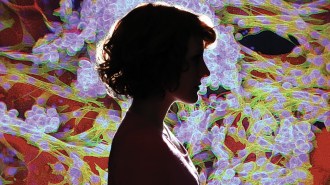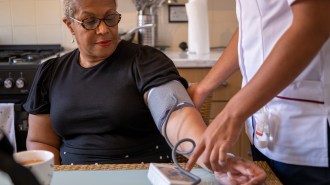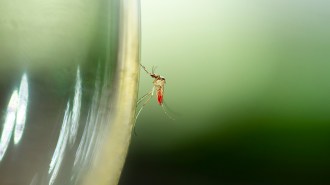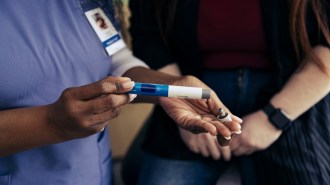Health & Medicine
-
 Health & Medicine
Health & MedicineWhy are so many young people getting cancer?
Diagnoses for several cancers before age 50 have been increasing rapidly since the 1990s. Scientists don’t know why, but they have a few suspects.
-
 Health & Medicine
Health & MedicineCancer patients froze reproductive tissue as kids. Now they’re coming back for it
Saving reproductive tissue from kids treated for cancer before adolescence could give them a chance at having biological children later in life.
By Meghan Rosen -
 Health & Medicine
Health & MedicineBrains don’t all act their age
A slew of new research attempts to zero in on what happens as our brains get older — and what can bring about those changes early.
-
 Health & Medicine
Health & MedicineA new drug shows promise for hard-to-treat high blood pressure
Results from a large trial suggest baxdrostat could provide a new option for people whose blood pressure remains high despite standard treatment.
By Isha Ishtiaq -
 Health & Medicine
Health & MedicineCOVID-19 is still a threat, but getting a vaccine is harder for many people
Vaccination is still important to ward off the worst of the coronavirus. Three experts discuss the concerns with restricting access.
-
 Humans
HumansWant to avoid mosquito bites? Step away from the beer
A Dutch music festival turned into a mosquito lab, revealing how beer, weed, sleep and sunscreen affect your bite appeal.
By Meghan Rosen - Health & Medicine
The brain preserves maps of missing hands for years
Countering the idea of large-scale rewiring, women whose hands were removed retained durable brain activity patterns linked to their missing fingers.
-
 Health & Medicine
Health & MedicineChemicals in marijuana may affect women’s fertility
THC in marijuana may help eggs become ready for fertilization. But this may come at the cost of more eggs with wrong numbers of chromosomes.
-
 Health & Medicine
Health & MedicineDrugs like Ozempic might lower cancer risk
GLP-1 medications like Ozempic, Wegovy and Mounjaro might lower people’s risk of developing certain cancers, especially ones linked to obesity.
By Meghan Rosen -
 Health & Medicine
Health & MedicineA cold today helps keep the COVID away
A recent cold appears to be a defense against COVID-19 and a partial explanation for kids’ tendency toward milder coronavirus infections.
-
 Health & Medicine
Health & MedicineA bioengineered protein may someday treat carbon monoxide poisoning
Mice treated with the protein, which is found in bacteria, quickly eliminated carbon monoxide from their body in their pee.
-
 Environment
EnvironmentRiver turbulence can push toxic pollutants into the air
Levels of hydrogen sulfide gas soared near a raging section of the Tijuana River in San Diego, exposing residents to potentially harmful air pollution.